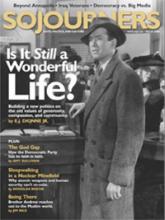Leading an Army infantry platoon in Baghdad for a year, I was awed by the young men and women serving there. Their dedication to one another, and to their ideals of service, was extraordinary. But when I came home, I was struck by how disconnected many Americans seemed from what troops were encountering in the war zone and the issues they faced when they returned to the United States. I was infuriated to see veterans struggling every day to get the medical care they need, to overcome bureaucratic red tape, and to transition to civilian life.
Caring for millions of combat veterans and their families will be one of America’s greatest challenges in a generation, but throughout the history of this country, people of faith have responded to crisis with love, compassion, and determination. For a country starkly polarized by this war, the church is one place where we can come together and pledge to love those who fought in it.
One of the wounded is my friend Army Spc. Wendell McLeod. McLeod’s head and back were badly injured when he was serving near the Iraqi border in Kuwait in 2005. McLeod was a sharp, jovial man from South Carolina who took great pride in his strength and independence. As a result of his injuries, however, his memory and mood have changed dramatically—and so has his life. He can no longer perform even simple tasks, such as brushing his teeth, unaided. His incredibly compassionate and dedicated wife, Annette, has said, “Now I’m married to a man I no longer know.” McLeod’s horrific experience has extended far beyond his physical wounds. At Walter Reed Army Medical Center, his injury was misdiagnosed; it took a year and a congressional investigation to get him the help he needed.
Read the Full Article
